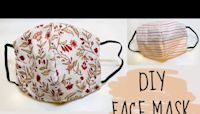Search results
- Interesting finds
Nov 4, 2023 · Yes. When used with measures such as getting vaccinated, hand-washing and physical distancing, wearing a face mask slows how quickly the virus that causes COVID-19 spreads. The U.S. Centers for Disease Control and Prevention (CDC) recommends wearing masks if you choose to, and in specific places and situations.
- What Are The Different Types of Masks?
- How Do I Properly Wear A Cloth Mask?
- How Do I Wash My Cloth Face Mask?
- How Often Should I Clean My Face Mask Or Covering?
- Face Masks and Covid-19
The CDC provides an overview of various types of masks and respirators. In general, the most important things you can do are to choose a mask that fits well, and wear it consistently and properly when it is recommended or in situations that you are required to do so.
Anytime you wear a mask, make sure: 1. You clean your hands with soap or hand sanitizer before putting the mask on or taking it off. 2. It is worn consistently and appropriately. A mask that is frequently pulled down to breathe or talk, or is worn under the nose, is not effective. 3. The mask conforms to your face without gaps — it is important tha...
Masks made of fabric, such as cotton, can be washed in your regular laundry using hot water.Disposable, blue surgical masks cannot be laundered or cleaned and should be thrown away when they are visibly soiled or damaged.After laundering your fabric masks, tumble dry them in the dryer on a high setting.You might consider using a nonscented laundry detergent if you are sensitive to perfumes, so it is easier to wear masks.You should clean your mask after every wearing. This reduces the risk of spreading the coronavirus or other germs.
Do I need to wear a face mask if I currently have COVID-19?
Yes. If you are actively infected with the coronavirus and cannot stay completely away from others in your home, droplets from your nose or mouth could infect another person. Stay away from others as much as possible and wear your mask around others until your doctor says it’s safe to discontinue wearing it.
Do I need to wear a mask if I am fully vaccinated and have received a booster?
Although being fully vaccinated and/or boosted reduces your chance of catching or spreading the coronavirus, it does not eliminate it entirely. If you are infected with the coronavirus and do not know it, a mask keeps your respiratory droplets and particles from infecting others. Check the mask recommendations in your area to help decide whether you need to mask.
Do I need to wear a mask if I am around someone who is at greater risk for getting COVID-19?
It is important to protect other people from getting COVID-19. Even if you are fully vaccinated and have a booster, wearing a mask provides an extra layer of protection, especially when you are around a person who may be at greater risk of COVID-19. Likewise, people who are at greater risk should strongly consider wearing a mask to help protect themselves.
May 16, 2024 · Which face masks are best for coronavirus? Face masks don't totally get rid of the risk of getting COVID, but all masks provide some level of protection. Properly fitting N95 masks are the most ...
Dec 18, 2021 · The best face masks for use against COVID-19 [Updated] Finding masks that meet CDC and WHO guidelines is tough. We did the work for you. Corey Gaskin - Dec 18, 2021 1:45 pm UTC.
- Corey Gaskin
Oct 29, 2023 · Marr said her team aerosolized the coronavirus, pulled it through a mask, and then examined how much virus survived on the mask. The study reported some viral particle remained on some cloth masks ...
Mar 1, 2024 · Generally, masks can help act as a filter to reduce the number of germs you breathe in or out. Their effectiveness can vary against different viruses, for example, based on the size of the virus. When worn by a person who has a virus, masks can reduce the chances they spread it to others. Masks can also protect wearers from inhaling germs; this ...









